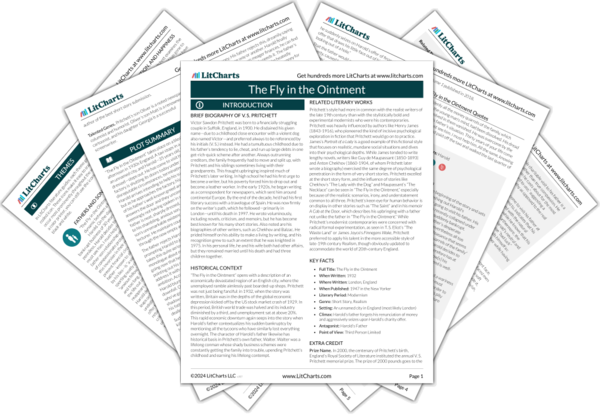In “The Fly in the Ointment,” Pritchett examines the ambiguous power of optimism. Harold has gone to visit his aging father, whose crooked dealings have finally ruined his business of 30 years. Harold’s father dismisses his son’s concerns about his future: “Worrying? You keep on using that word. I’m not worrying. Things are fine.” When Harold replies, “you always were an optimist,” his father launches into a dramatic defense of his optimism as the only thing keeping him alive in the face of a bleak financial future. He proceeds to turn the point around on his son, belittling his provincial career: “I wouldn’t be satisfied lecturing to a small batch of people in a university town. I’d lecture the world.” The father’s “optimism” has little to do with cheeriness, and it seems to converge with narcissism and blind ambition. Harold retaliates that “thinking big” has ruined his father, then backtracks to insist that he’s not “like” his father. Indeed, he is not: lacking his father’s narcissism, he seems also to lack the general “optimism” that has allowed his father to lead, at the very least, an interesting life. The father’s underlying belief that his goals are achievable seems to have sustained his checkered but ambitious career, whereas the son seems resigned to an undistinguished fate. This basic difference emerges in the father’s overreaction to the fly in his office, which nevertheless is a reaction, while the son simply says, “If we leave the door open […] it will go.” The story presents the optimist father as a malignant presence compared to his passive son, but it leaves the reader to ponder which of these two ways of moving through the world ultimately leads to real contentment.
Optimism, Ambition, and Happiness ThemeTracker

Optimism, Ambition, and Happiness Quotes in The Fly in the Ointment
The father was well-dressed in an excellent navy-blue suit. He was a vigorous, broad man with a pleased impish smile. The sunburn shone through the clipped white hair of his head and he had the simple, trim, open-air look of a snow man. The son beside him was round-shouldered and shabby, a keen but anxious fellow in need of a hair-cut and going bald.
“[…]what you want, what we all want, I say this for myself as well as you, what we all want is ideas—big ideas. We go worrying along but you just want bigger and better ideas. You ought to think big. Take your case. You’re a lecturer. I wouldn’t be satisfied with lecturing to a small batch of people in a university town. I’d lecture the world. You know, you’re always doing yourself injustice. We all do. Think big.”
“Yes, can’t you hear it? It’s peculiar how you can hear everything now the machines have stopped. It took me quite a time to get used to the silence. Can you see it, old chap? I can’t stand flies, you never know where they’ve been.”
“Don’t say I want money,” the old man said vehemently. “Don’t say it. When I walk out of this place tonight I’m going to walk into freedom. I am not going to think of money. You never know where it will come from. You may see something. You may meet a man. You never know. Did the children of Israel worry about money? No, they just went out and collected the manna. That’s what I want to do.”
He coloured. He hated to admit his own poverty, he hated to offer charity to his father. He hated to sit there knowing the things he knew about him. He was ashamed to think how he, how they all dreaded having the gregarious, optimistic, extravagant, uncontrollable, disingenuous old man on their hands. The son hated to feel he was being in some peculiar way which he could not understand mean, cowardly and dishonest.











